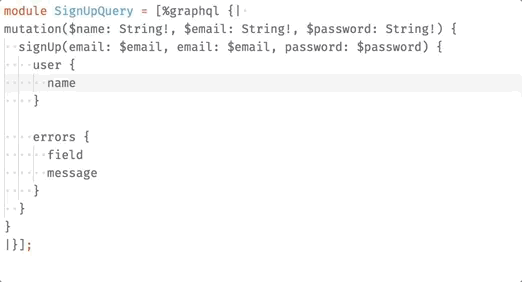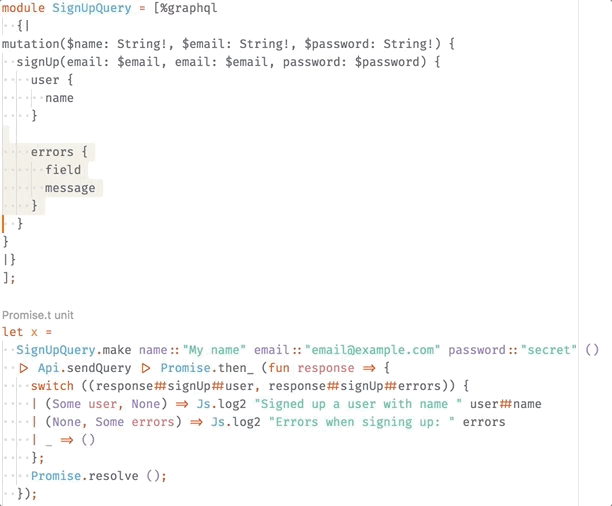Work in progress: only a small subset of GraphQL is implemented and there are probably a lot of bugs.
This library lets you construct type-safe and validated queries at compile time, and generates response validation code for you. If you're writing a Bucklescript app that talks to a GraphQL server, this library will cut down on the boilerplate you have to write.
It is compatible with both OCaml and ReasonML syntax. There are no runtime
dependencies except for Js.Json and Js.Dict, both included in the
Bucklescript standard library.
Assuming that you've already got a Bucklescript project set up, installing this syntax extension consists of three steps:
First, install the OPAM package to download and build the transform itself:
opam install graphql_ppxNext, add this package as a dependency to your package.json:
yarn add --dev graphql_ppx
# or, if you use npm:
npm install --saveDev graphql_ppxFinally, add the PPX to your bsconfig.json:
{
"ppx-flags": [
"graphql_ppx/ppx"
]
}Note: If you want to use this, make sure to read the limitations at the bottom of this readme first!
If you add a field that does not exist, you'll get a compiler error on the exact location this happens. This automatically works with Merlin, giving you immediate feedback in your editor:
Variables sent to queries and mutations are of course typed too. Nullable variables are translated to optional labelled arguments, while non-null variables become mandatory arguments:
(The Api.sendQuery function here is a small wrapper around bs-fetch, check it out below)
The result of a query is turned into a typed Js.t object, which will generate compiler errors if you try to access fields that don't exist:
While these examples use the ReasonML syntax, using the standard OCaml syntax works as well.
This plugin requires a graphql_schema.json file to exist somewhere in the
project hierarchy, containing the result of sending an introspection
query
to your backend.
To help you with this, a simple script is included to send this query to a
server and save the result as graphql_schema.json in the current directory.
yarn send-introspection-query http://my-api.example.com/api
# or, if you use npm
npm run send-introspection-query http://my-api.example.com/apiTo define a query, you declare a new module and type the query as a string
inside the graphql extension:
module HeroQuery = [%graphql {|
{
hero {
name
}
}
|}];This module exposes a few functions, but the most useful one is make, which
takes all arguments to the query/mutation as labelled function arguments, ending
with (). It an object containing three things: query, which is a string
containing the query itself; variables, a Js.Json.t object containing the
serialized variables for the query; and parse, a function that takes a
Js.Json.t instance and returns a typed object corresponding to the query.
A simple example might make this a bit clear:
module HeroQuery = [%graphql {| { hero { name } } |}];
/* Construct a "packaged" query; HeroQuery takes no arguments: */
let heroQuery = HeroQuery.make ();
/* Send this query string to the server */
let query = heroQuery##query;
/* Let's assume that this was the result we got back from the server */
let sampleResponse = "{ \"hero\": {\"name\": \"R2-D2\"} }";
/* Convert the response to JSON and parse the result */
let result = Js.Json.parseExn sampleResponse |> query##parse;
/* Now you've got a well-typed object! */
Js.log ("The hero of the story is " ^ result##hero##name);bs-fetch is a wrapper around the Fetch API. I've been using this simple function to send/parse queries:
exception Graphql_error string;
let sendQuery q =>
Bs_fetch.(
fetchWithInit
"https://my-api.example.com/api"
(
RequestInit.make
method_::Post
body::(
Js.Dict.fromList [("query", Js.Json.string q##query), ("variables", q##variables)] |> Js.Json.object_ |> Js.Json.stringify |> BodyInit.make
)
credentials::Include
headers::(HeadersInit.makeWithArray [|("content-type", "application/json")|])
()
) |>
Js.Promise.then_ (
fun resp =>
if (Response.ok resp) {
Response.json resp |>
Js.Promise.then_ (
fun data =>
switch (Js.Json.decodeObject data) {
| Some obj => Js.Dict.unsafeGet obj "data" |> q##parse |> Js.Promise.resolve
| None => Js.Promise.reject @@ Graphql_error "Response is not an object"
}
)
} else {
Js.Promise.reject @@ Graphql_error ("Request failed: " ^ Response.statusText resp)
}
)
);This implementation is incomplete. It does not support:
- Non-inline fragments of any kind.
- Interfaces.
- All GraphQL validations. It will not validate argument types and do other sanity-checking of the queries. The fact that a query compiles does not mean that it will pass server-side validation.
- Objects are converted into
Js.tobjects - Enums are converted into polymorphic variants
- Floats, ints, strings, booleans, id are converted into their corresponding native OCaml types.
- Custom scalars are parsed as
Js.Json.t - Arguments with input objects
- Using
@skipand@includewill force non-optional fields to become optional. - Unions are converted to polymorphic variants, with exhaustiveness checking. This only works for object types, not for unions containing interfaces.
By using some directives prefixed bs, graphql_ppx lets you modify how the
result of a query is parsed. All these directives will be removed from the query
at compile time, so your server doesn't have to support them.
While Js.t objects often have their advantages, they also come with some
limitations. For example, you can't create new objects using the spread (...)
syntax or pattern match on their contents. Since they are not named, they also
result in quite large type error messages when there are mismatches.
OCaml records, on the other hand, can be pattern matched, created using the
spread syntax, and give nicer error messages when they mismatch. graphql_ppx
gives you the option to decode a field as a record using the @bsRecord
directive:
type hero = {
name: string,
height: number,
mass: number
};
module HeroQuery = [%graphql {|
{
hero @bsRecord {
name
height
mass
}
}
|}];Note that the record has to already exist and be in scope for this to work.
graphql_ppx will not create the record. Even though this involves some
duplication of both names and types, type errors will be generated if there are
any mismatches.
If you've got a custom scalar, or just want to convert e.g. an integer to a
string to properly fit a record type (see above), you can use the @bsDecoder
directive to insert a custom function in the decoder:
module HeroQuery = [%graphql {|
{
hero {
name
height @bsDecoder(fn: "string_of_float")
mass
}
}
|}];In this example, height will be converted from a number to a string in the
result. Using the fn argument, you can specify any function literal you want.
If you've got an object which in practice behave like a variant - like signUp
above, where you either get a user or a list of errors - you can add a
@bsVariant directive to the field to turn it into a polymorphic variant:
module SignUpQuery = [%graphql
{|
mutation($name: String!, $email: String!, $password: String!) {
signUp(email: $email, email: $email, password: $password) @bsVariant {
user {
name
}
errors {
field
message
}
}
}
|}
];
let x =
SignUpQuery.make name::"My name" email::"email@example.com" password::"secret" ()
|> Api.sendQuery |> Promise.then_ (fun response => {
switch (response##signUp) {
| `User user => Js.log2 "Signed up a user with name " user##name
| `Errors errors => Js.log2 "Errors when signing up: " errors
} |> Promise.resolve
});This helps with the fairly common pattern for mutations that can fail with user-readable errors.
Core GraphQL features that need to be implemented:
- Inline fragments
- Fragment spreads
- Selecting on interfaces
- Selecting on unions
- Input object arguments
- Query validations
- Explicit resolvers for custom scalars
Nice-to-have features:
-
Using external records instead of objects, useful if you've already defined a record that you want to use in the rest of the codebase:
{ hero @bsRecord(name: "Model.hero") { name homePlanet } }The same could probably be built for GraphQL enums.


